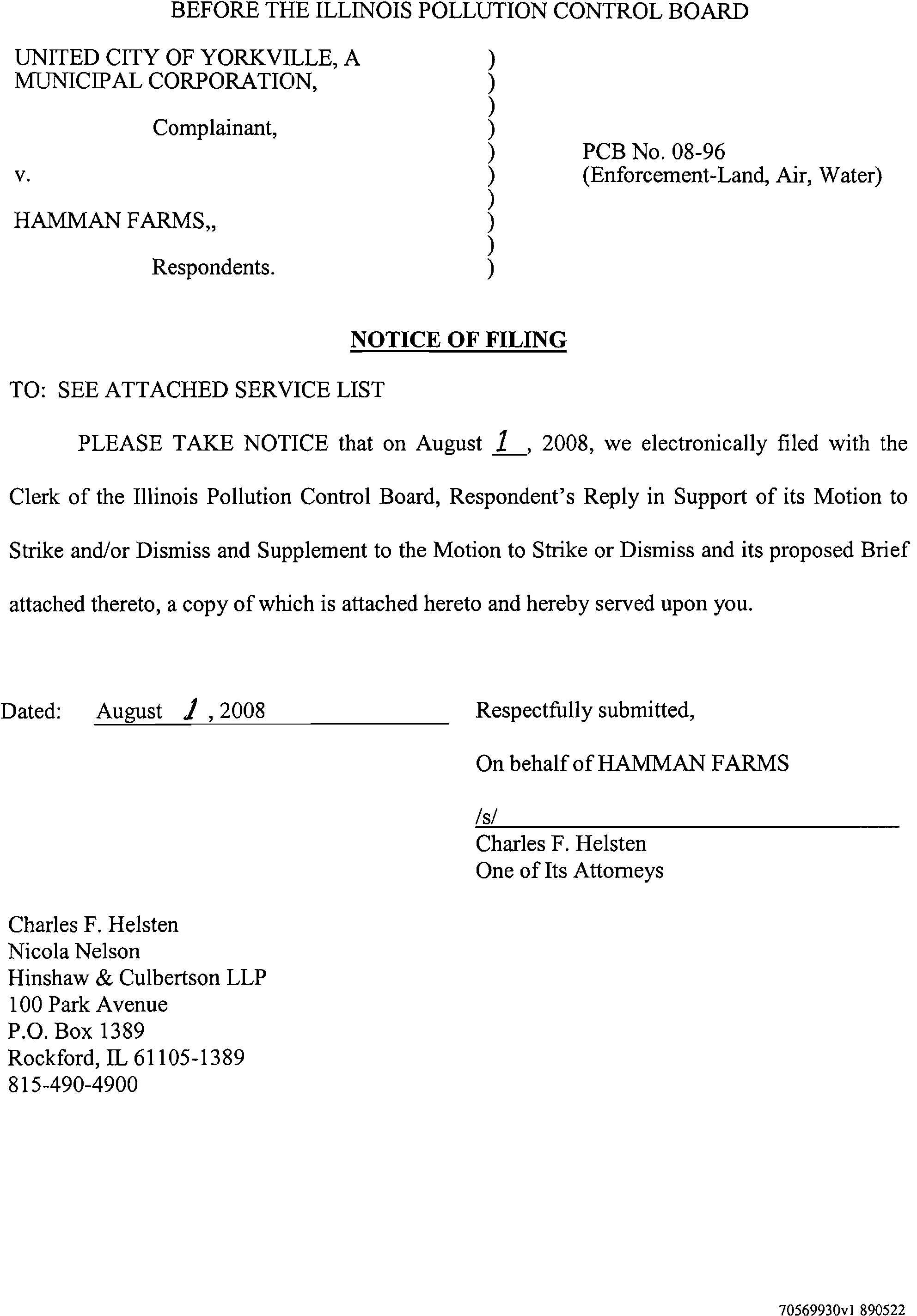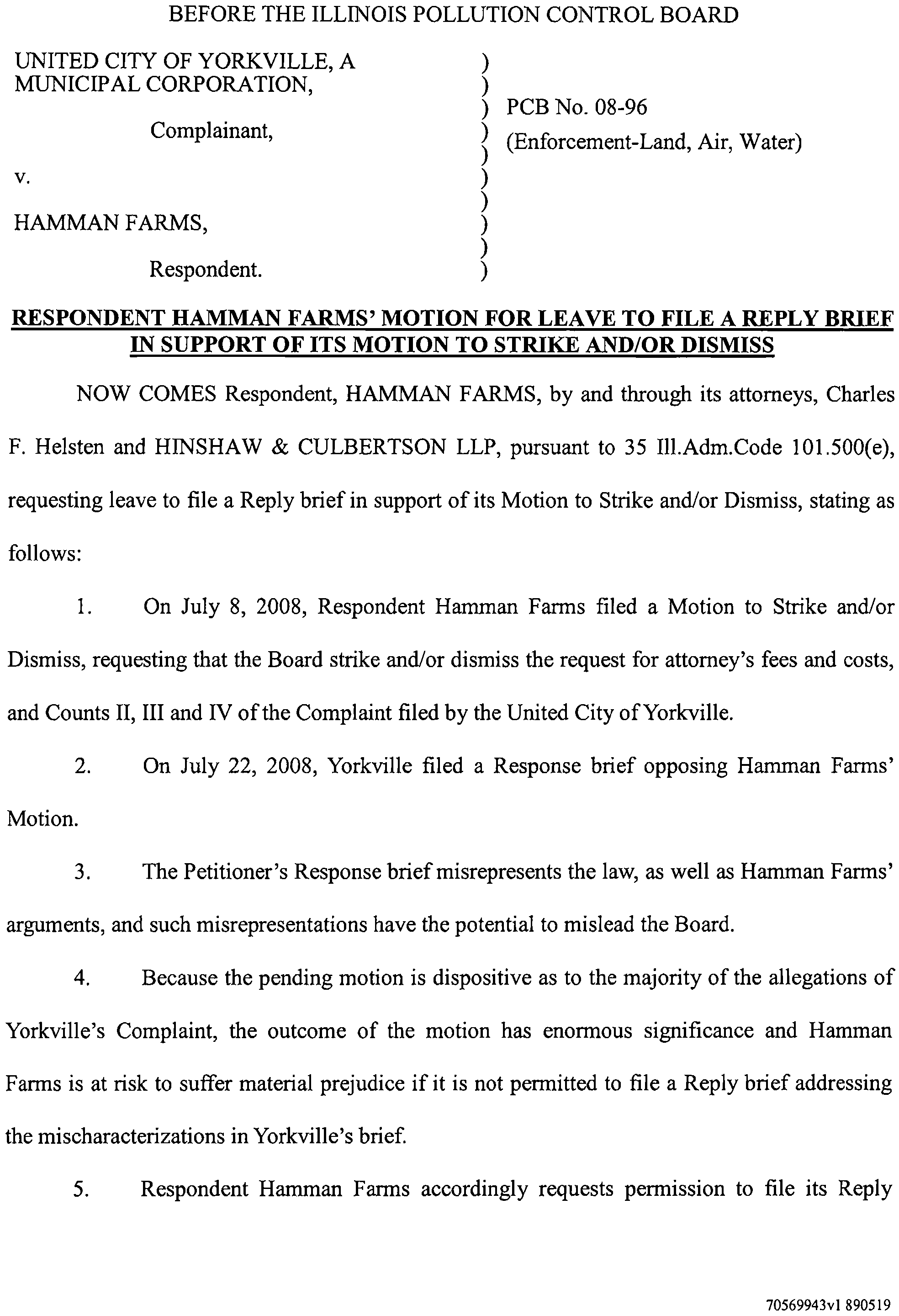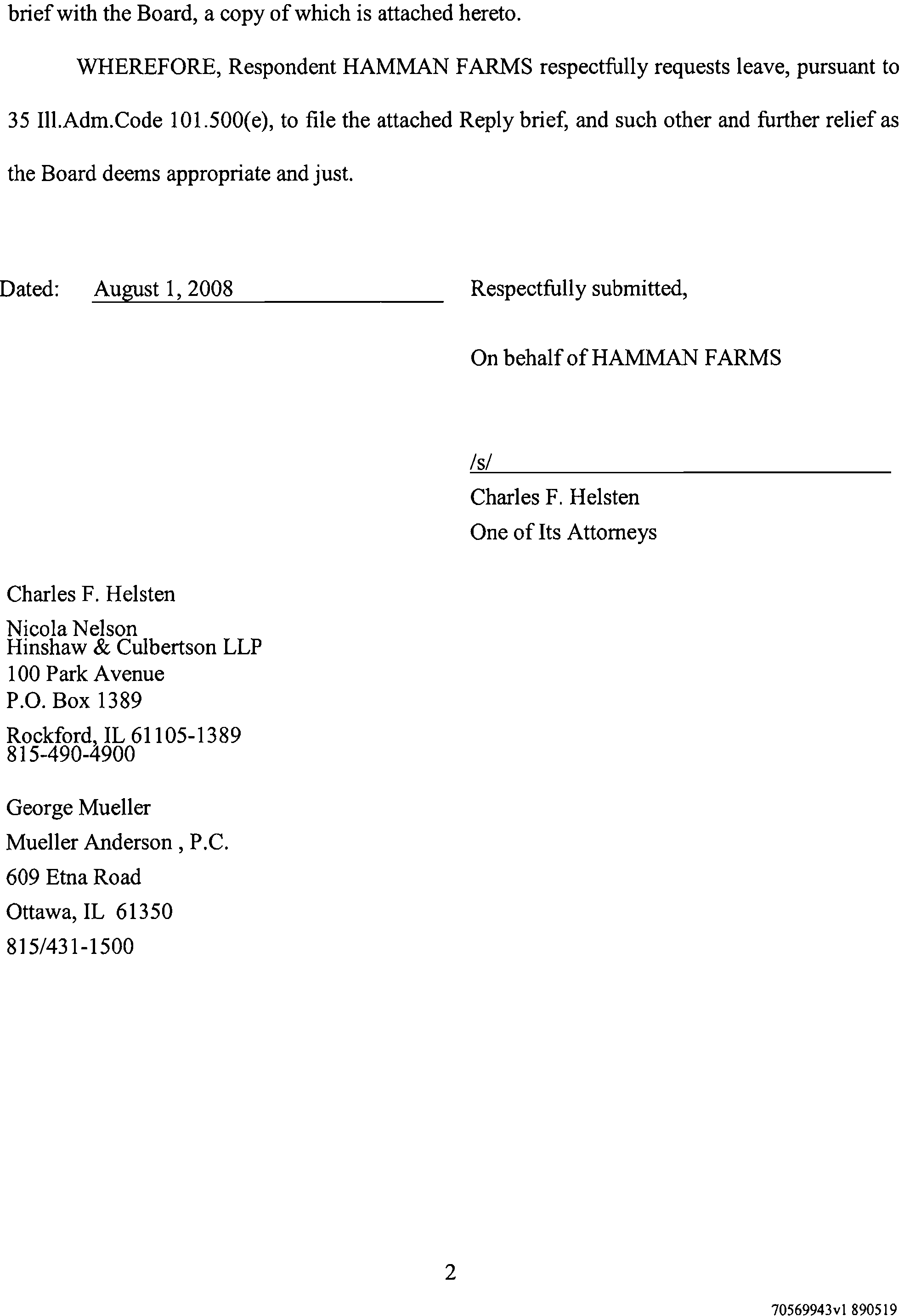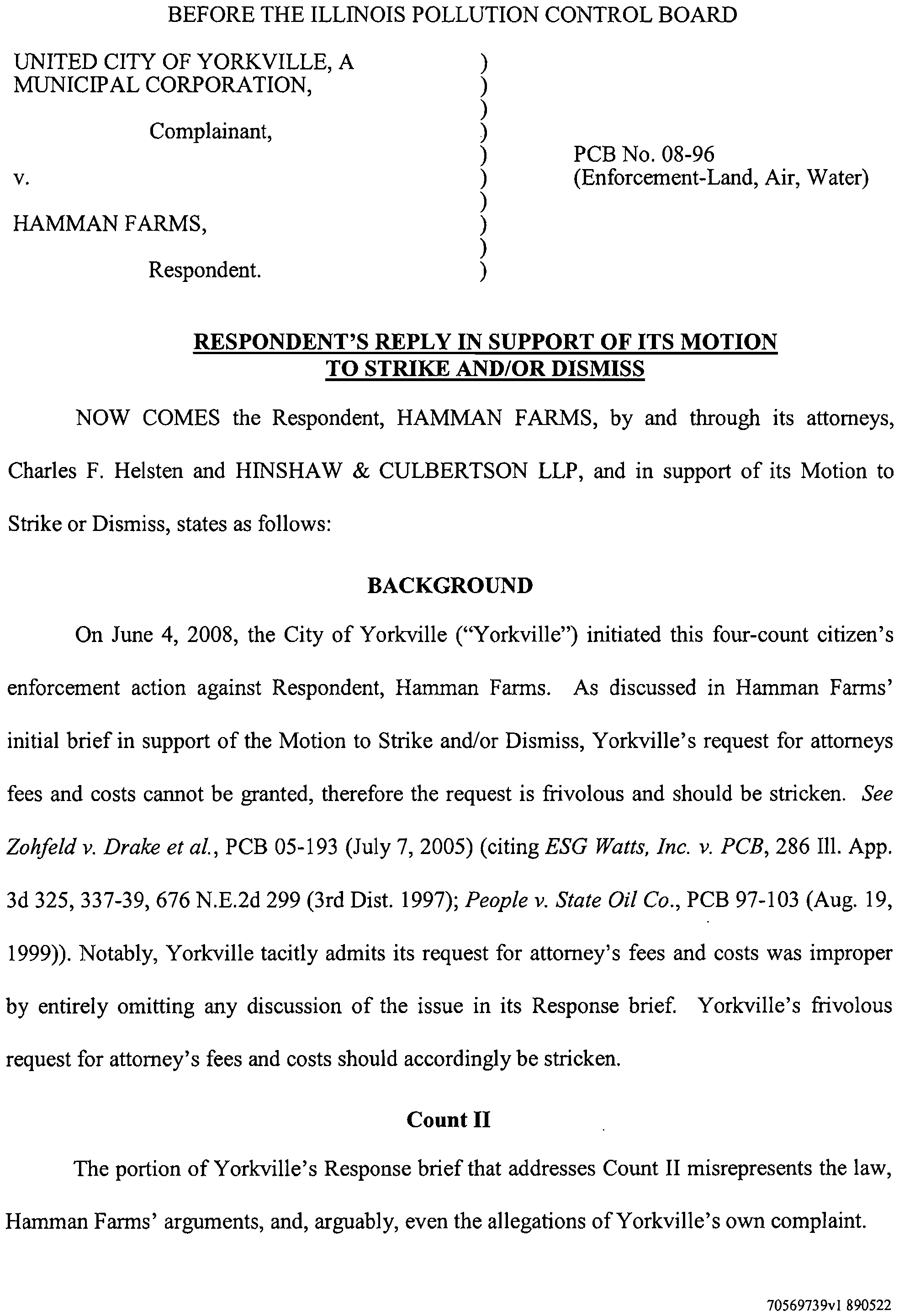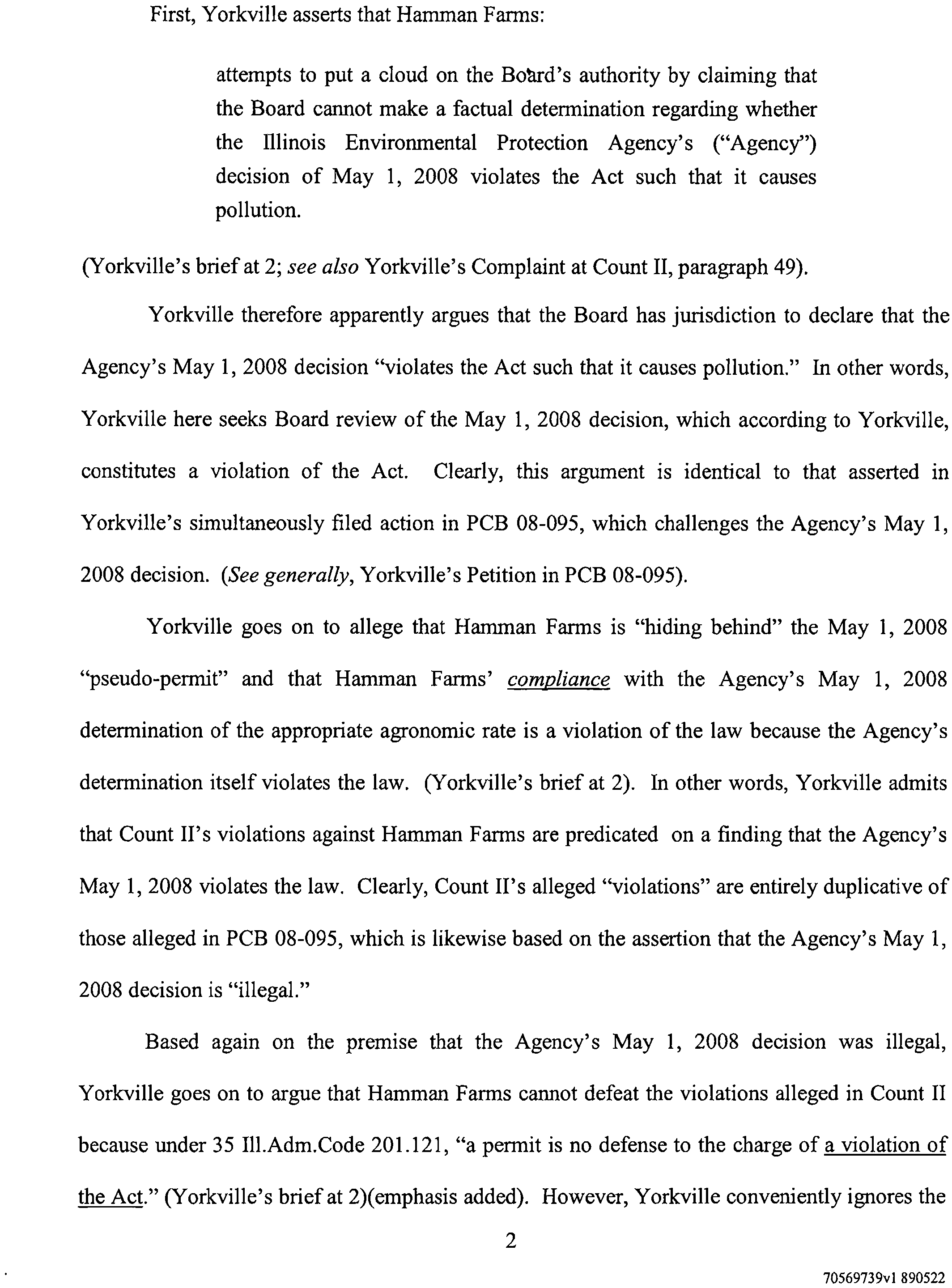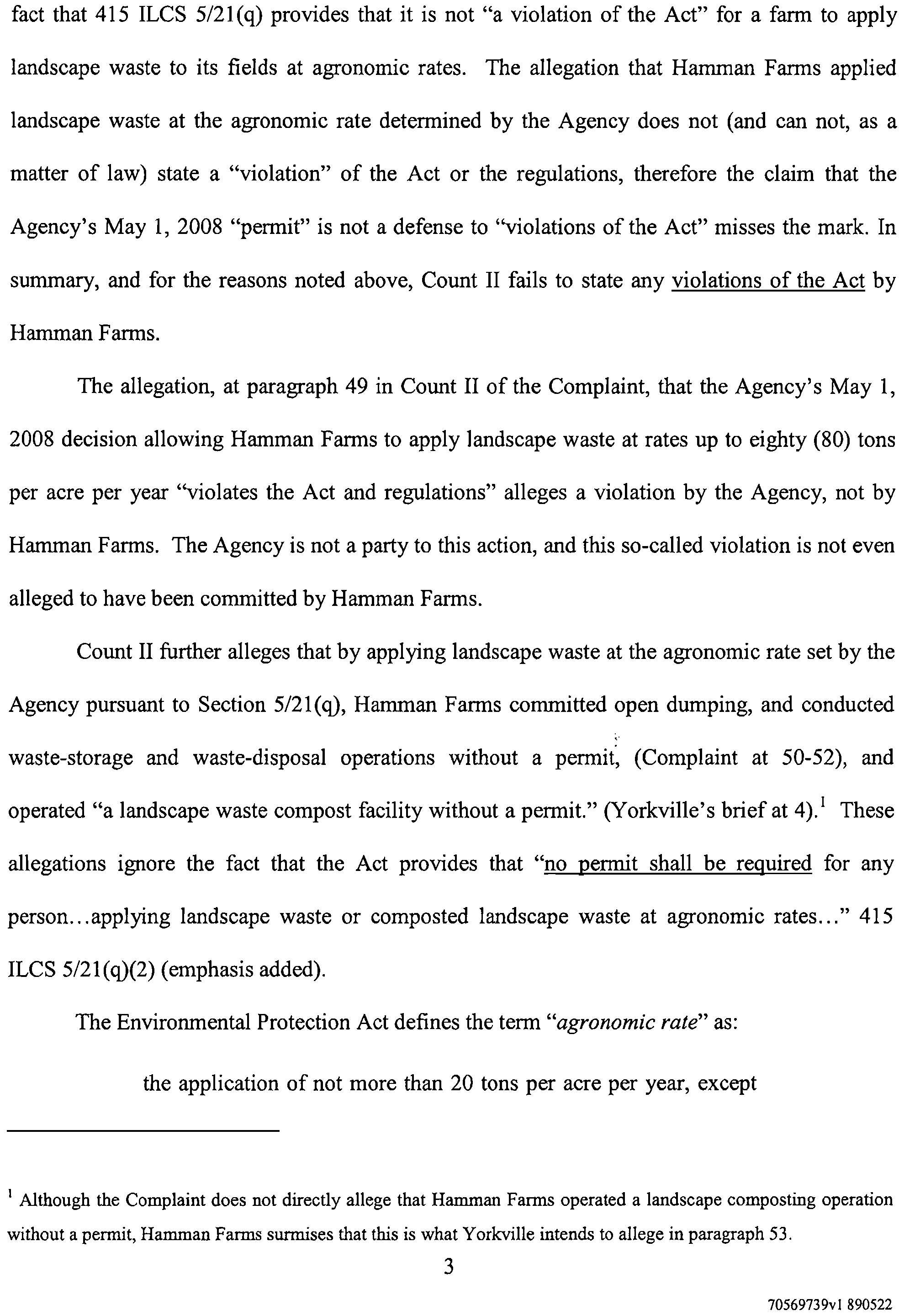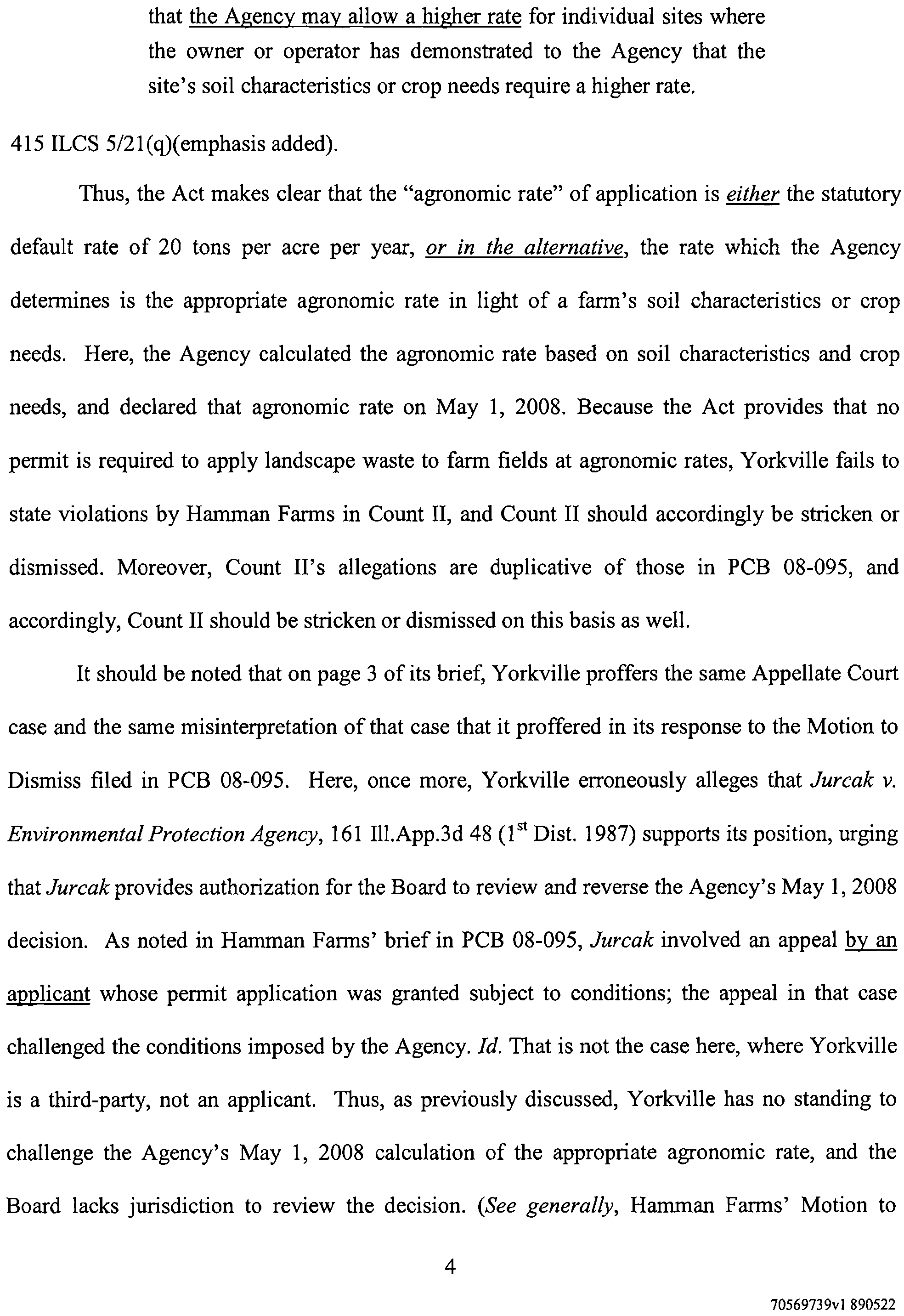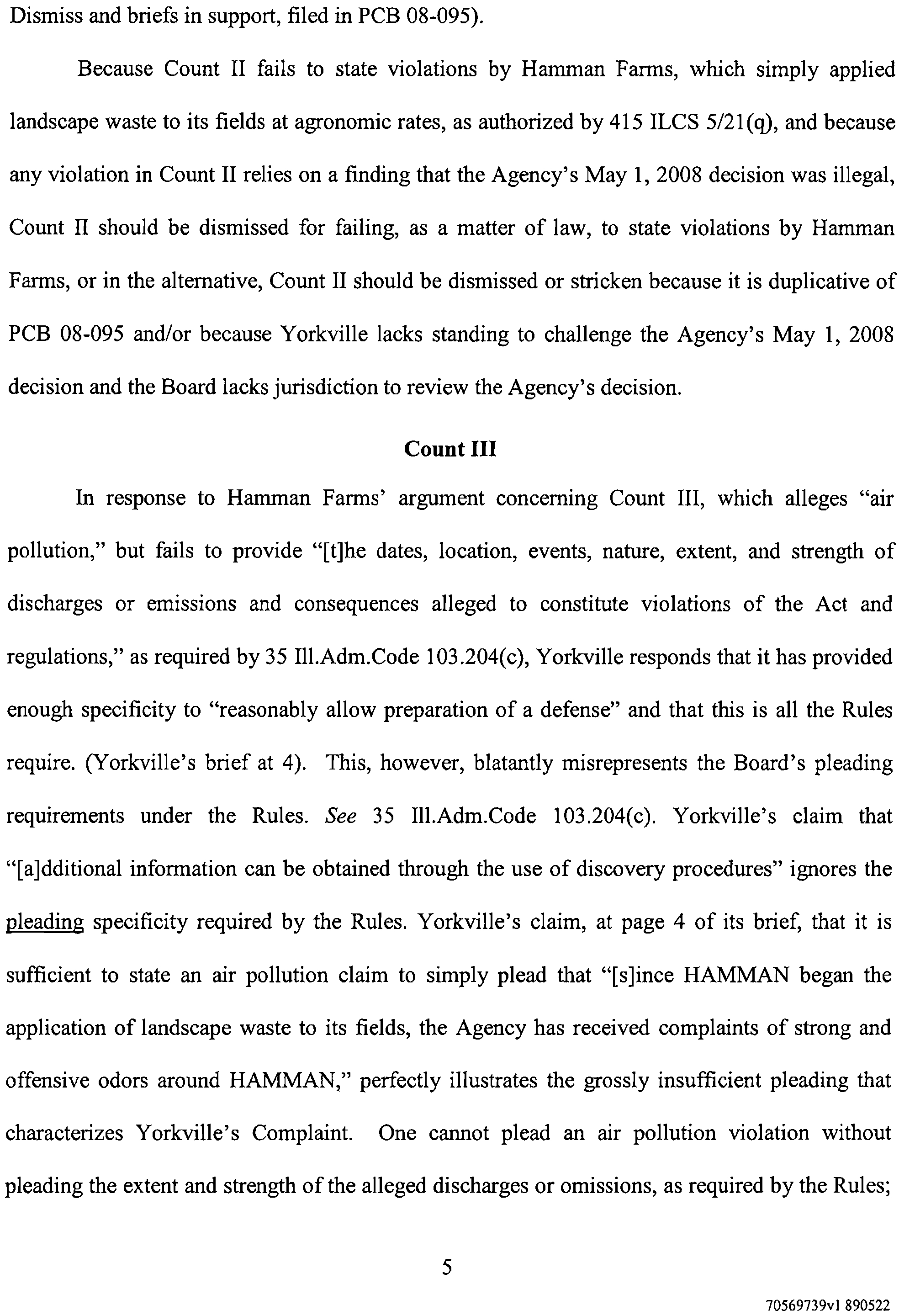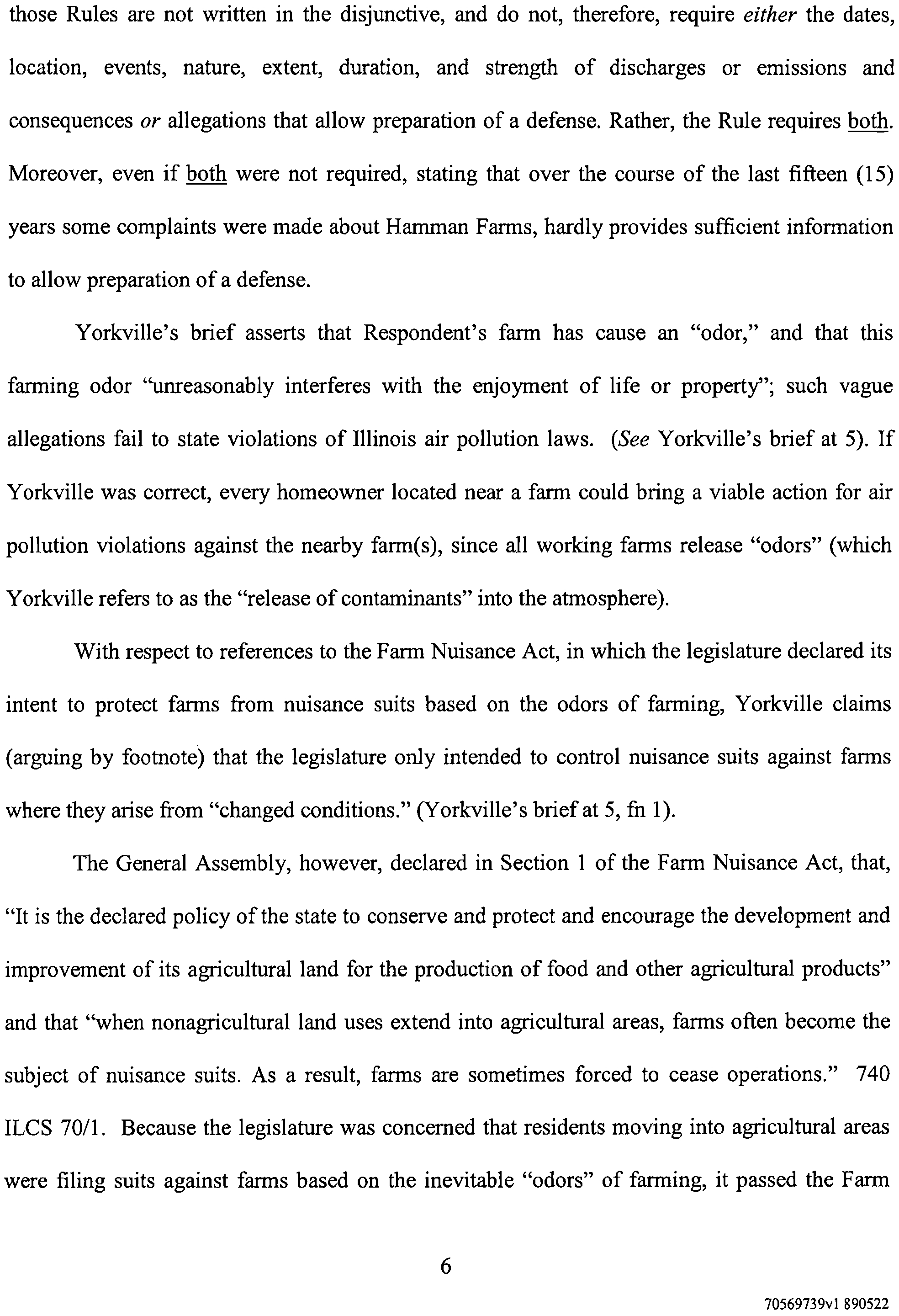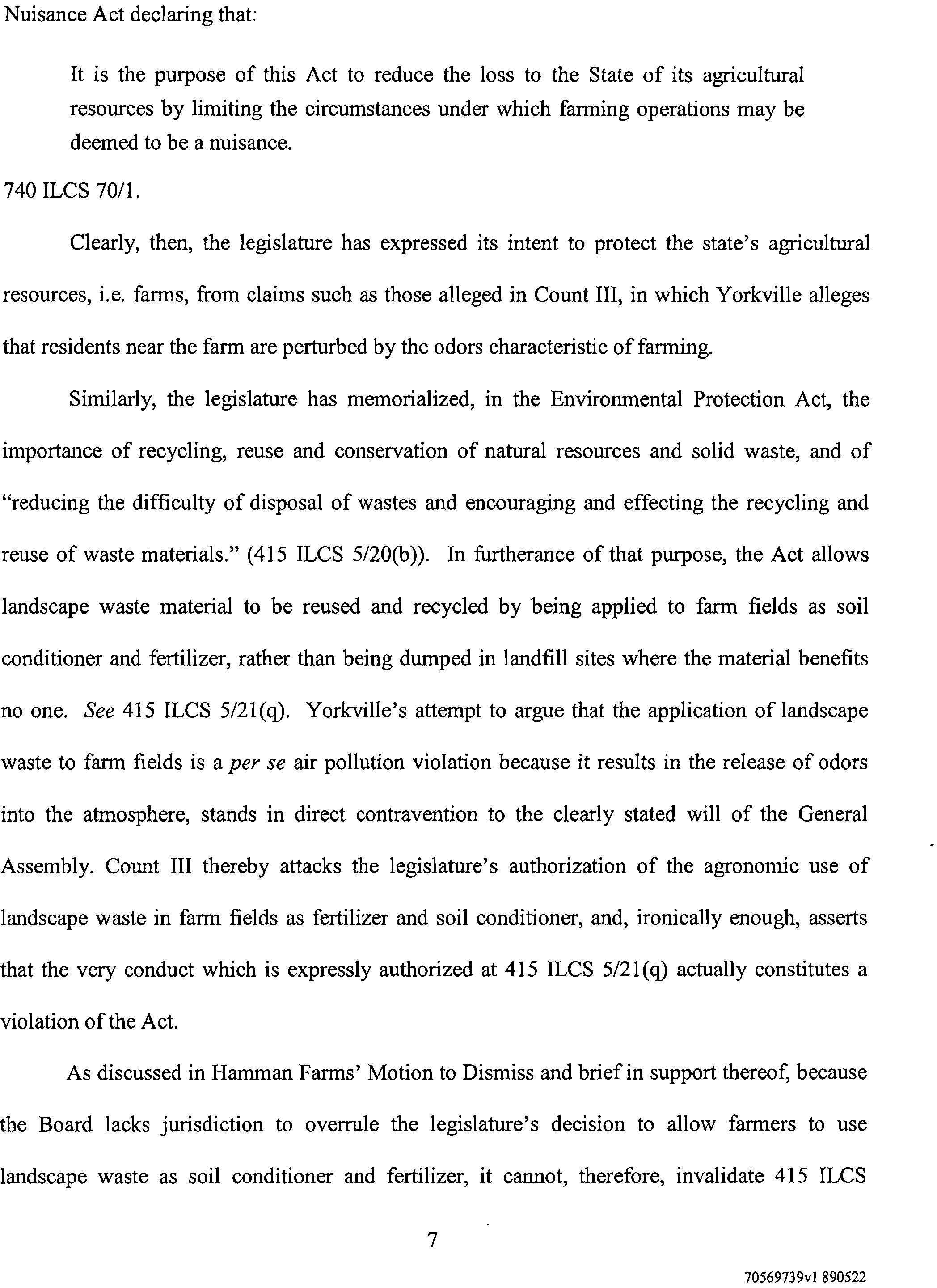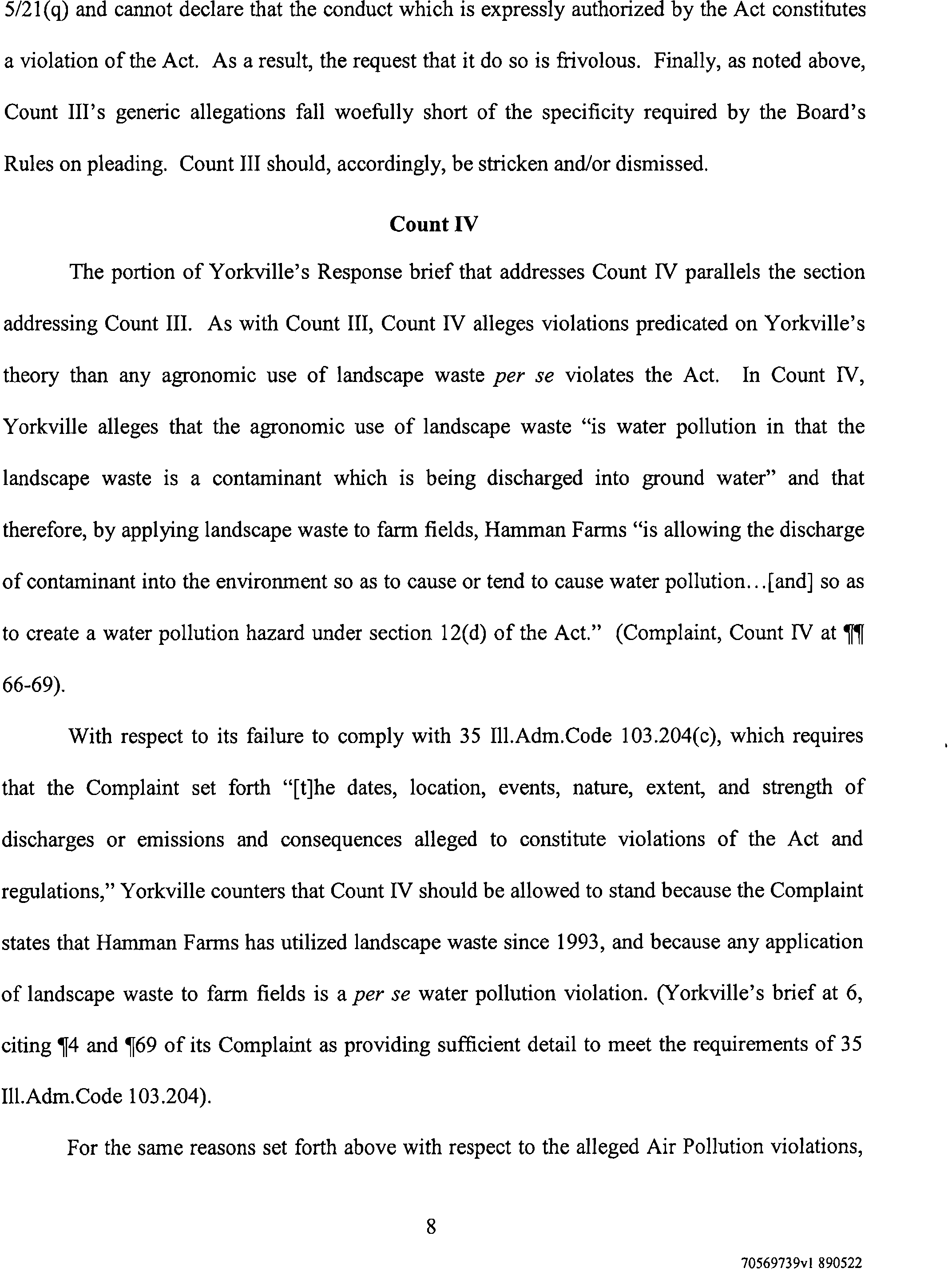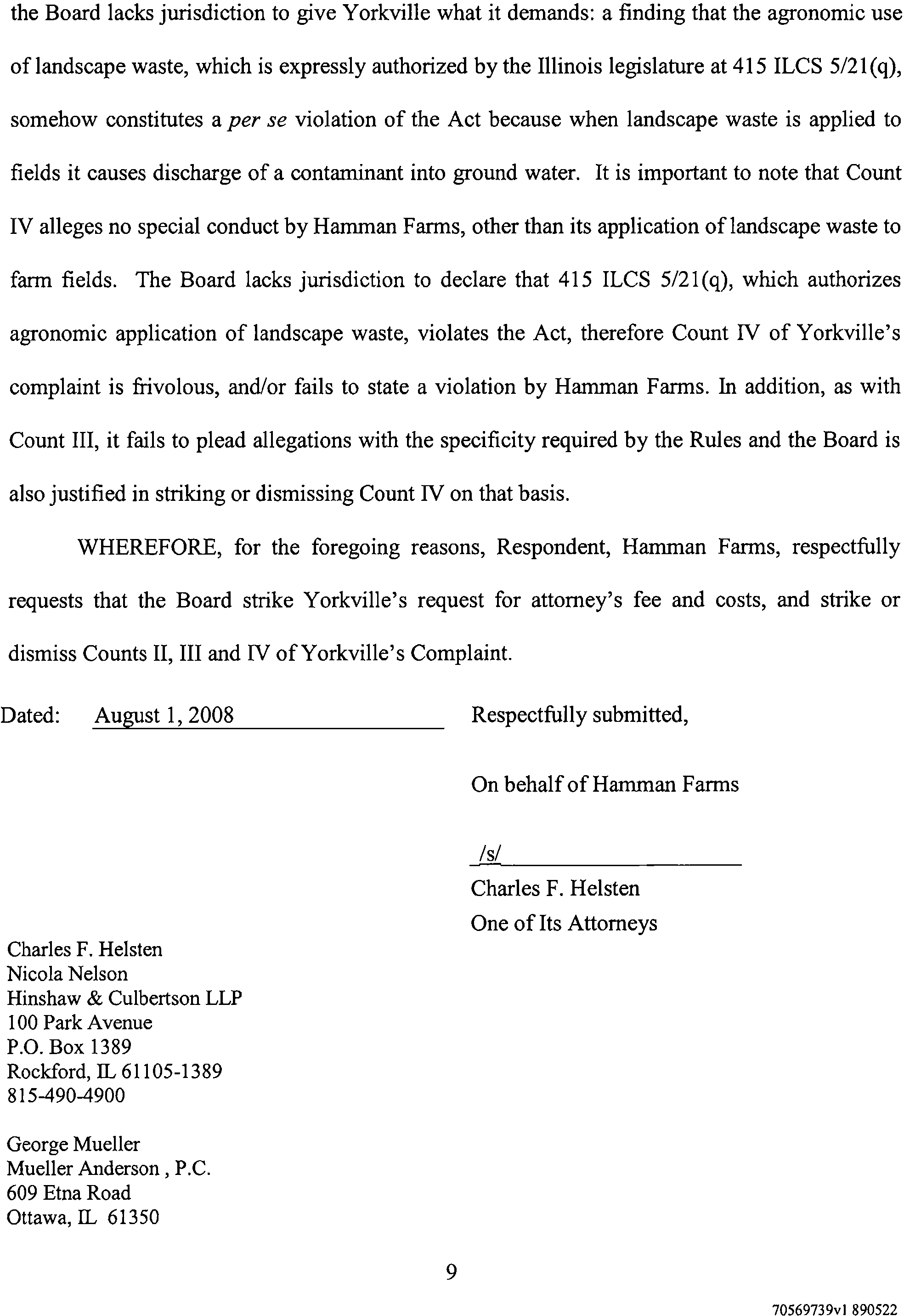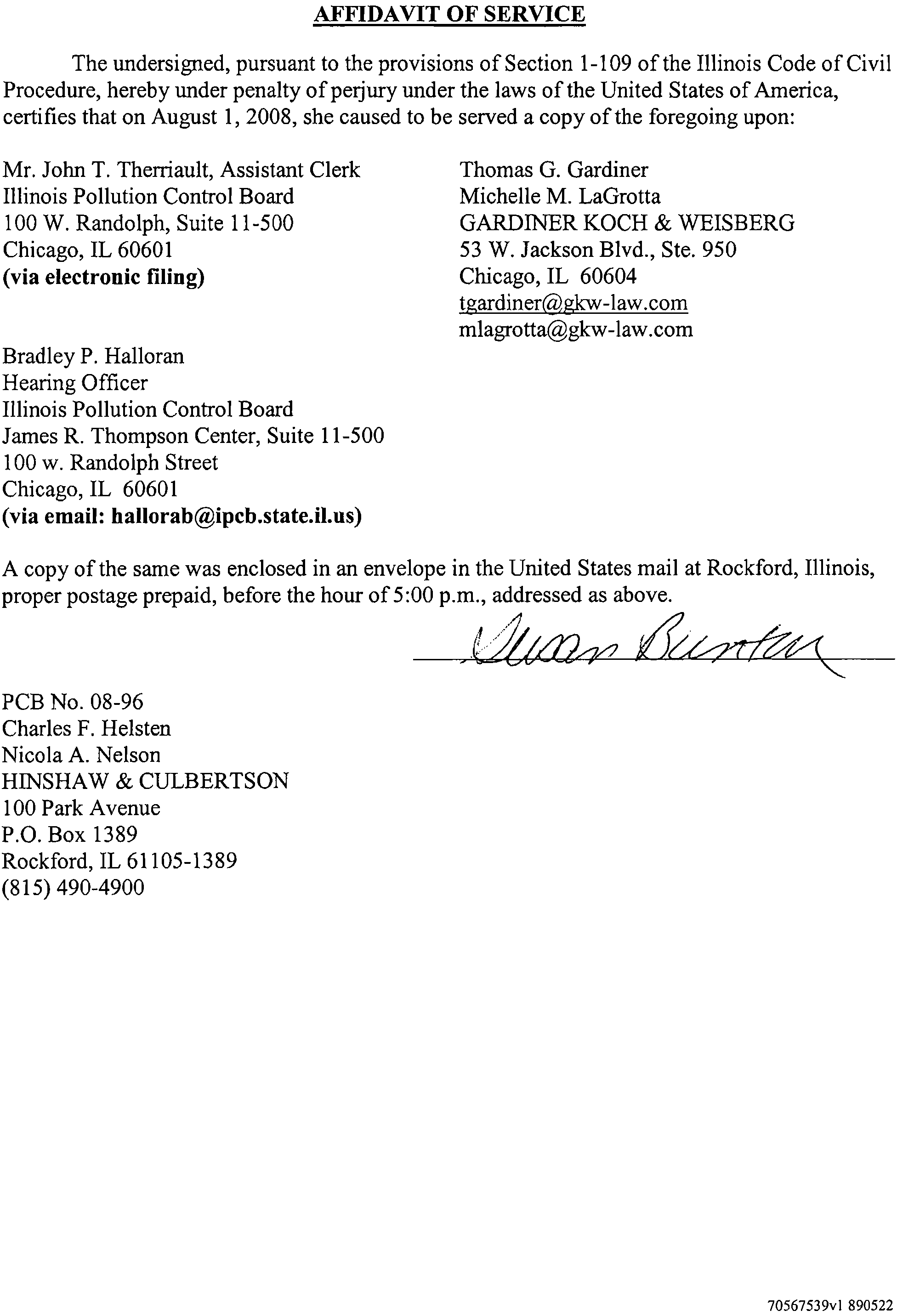BEFORE THE ILLINOIS POLLUTION CONTROL BOARD
UNITED CITY OF YORKVILLE, A
MUNICIPAL CORPORATION,
Complainant,
v.
HAMMAN FARMS"
Respondents.
)
)
)
)
)
)
)
)
)
)
PCB No. 08-96
(Enforcement-Land, Air, Water)
NOTICE OF FILING
TO: SEE ATTACHED SERVICE LIST
PLEASE TAKE NOTICE that on August
L
2008, we electronically filed with the
Clerk
of the Illinois Pollution Control Board, Respondent's Reply in Support of its Motion to
Strike and/or Dismiss and Supplement to the Motion to Strike or Dismiss and its proposed Brief
attached thereto, a copy
of which is attached hereto and hereby served upon you.
Dated:
August
1,
2008
Charles F. Helsten
Nicola Nelson
Hinshaw
&
Culbertson LLP
100 Park Avenue
P.O. Box 1389
Rockford, IL 61105-1389
815-490-4900
Respectfully submitted,
On behalf
of HAMMAN FARMS
/s/
Charles F. Helsten
One
of Its Attorneys
70569930vl 890522
Electronic Filing - Received, Clerk's Office August 1, 2008
BEFORE THE ILLINOIS POLLUTION CONTROL BOARD
UNITED CITY
OF YORKVILLE, A
MUNICIPAL CORPORATION,
Complainant,
v.
HAMMAN FARMS,
Respondent.
)
)
) PCB No. 08-96
~
(Enforcement-Land, Air, Water)
)
)
)
)
)
RESPONDENT HAMMAN FARMS'MOTION FOR LEAVE TO FILE A REPLY BRIEF
IN SUPPORT OF ITS MOTION TO STRIKE AND/OR DISMISS
NOW COMES Respondent, HAMMAN FARMS, by and through its attorneys, Charles
F. Helsten and HINSHAW & CULBERTSON LLP, pursuant to 35 Ill.Adm.Code 101.500(e),
requesting leave to file a Reply brief in support
of its Motion to Strike and/or Dismiss, stating as
follows:
1.
On July 8, 2008, Respondent Hamman Farms filed a Motion to Strike and/or
Dismiss, requesting that the Board strike and/or dismiss the request for attorney's fees and costs,
and Counts II, III and IV
ofthe Complaint filed by the United City ofYorkville.
2.
On July 22, 2008, Yorkville filed a Response brief opposing Hamman Farms'
Motion.
3.
The Petitioner's Response briefmisrepresents the law, as well as Hamman Farms'
arguments, and such misrepresentations have the potential
to mislead the Board.
4.
Because the pending motion is dispositive as to the majority of the allegations of
Yorkville's Complaint, the outcome of the motion has enormous significance and Hamman
Farms
is at risk to suffer material prejudice if it is not permitted to file a Reply brief addressing
the mischaracterizations in Yorkville'sbrief.
5.
Respondent Hamman Farms accordingly requests permission to file its Reply
70569943vl890519
Electronic Filing - Received, Clerk's Office August 1, 2008
briefwith the Board, a copy of which is attached hereto.
WHEREFORE, Respondent HAMMAN FARMS respectfully requests leave, pursuant to
35 Ill.Adm.Code 101.500(e), to file the attached Reply brief, and such other and further relief as
the Board deems appropriate and just.
Dated:
August 1, 2008
Charles
F. Helsten
Nicola Nelson
Hinshaw
&
Culbertson
LLP
100 Park Avenue
P.O. Box 1389
Rockford,
IL
61105-1389
815-490-4900
George Mueller
Mueller Anderson, P.C.
609 Etna Road
Ottawa,IL
61350
815/431-1500
2
Respectfully submitted,
On behalf
of HAMMAN FARMS
/s/
Charles
F. Helsten
One
of Its Attorneys
70569943v1 890519
Electronic Filing - Received, Clerk's Office August 1, 2008
BEFORE THE ILLINOIS POLLUTION CONTROL BOARD
UNITED CITY OF YORKVILLE, A
MUNICIPAL CORPORATION,
Complainant,
v.
HAMMAN FARMS,
Respondent.
)
)
)
)
)
)
)
)
)
)
PCB No. 08-96
(Enforcement-Land, Air, Water)
RESPONDENT'S REPLY IN SUPPORT OF ITS MOTION
TO STRIKE AND/OR DISMISS
NOW COMES the Respondent, HAMMAN FARMS, by and through its attorneys,
Charles
F. Helsten and HINSHAW
&
CULBERTSON LLP, and in support of its Motion to
Strike or Dismiss, states as follows:
BACKGROUND
On June 4, 2008, the City
of Yorkville ("Yorkville") initiated this four-count citizen's
enforcement action against Respondent, Hamman Farms. As discussed in Hamman Farms'
initial brief in support
of the Motion to Strike and/or Dismiss, Yorkville's request for attorneys
fees and costs cannot be granted, therefore the request is frivolous and should be stricken.
See
Zohfeld
v.
Drake et aI.,
PCB 05-193 (July 7,2005) (citing
ESG Watts, Inc.
v.
PCB,
286 Ill. App.
3d 325,337-39,676 N.E.2d 299 (3rd Dist. 1997);
People
v.
State Oil Co.,
PCB 97-103 (Aug. 19,
1999». Notably, Yorkville tacitly admits its request for attorney's fees and costs was improper
by entirely omitting any discussion of the issue in its Response brief Yorkville's frivolous
request for attorney's fees and costs should accordingly be stricken.
Count II
The portion of Yorkville's Response brief that addresses Count II misrepresents the law,
Hamman Farms' arguments, and, arguably, even the allegations of Yorkville'sown complaint.
70569739vl 890522
Electronic Filing - Received, Clerk's Office August 1, 2008
First, Yorkville asserts that Hamman Farms:
attempts to put a cloud on the
Bom-d's authority by claiming that
the Board cannot make a factual determination regarding whether
the lllinois Environmental Protection Agency's ("Agency")
decision
of May 1, 2008 violates the Act such that it causes
pollution.
(Yorkville's briefat
2;
see also
Yorkville's Complaint at Count II, paragraph 49).
Yorkville therefore apparently argues that the Board has jurisdiction
to declare that the
Agency's May
1, 2008 decision ''violatesthe Act such that it causes pollution."
In
other words,
Yorkville here seeks Board review
of the May 1, 2008 decision, which according to Yorkville,
constitutes a violation
of the Act. Clearly, this argument is identical to that asserted in
Yorkville's simultaneously filed action in PCB 08-095, which challenges the Agency's May
1,
2008 decision.
(See generally,
Yorkville'sPetition in PCB 08-095).
Yorkville goes on
to allege that Hamman Farms is "hiding behind" the May 1, 2008
"pseudo-permit" and that Hamman Farms'
compliance
with the Agency's May 1, 2008
determination
of the appropriate agronomic rate is a violation of the law because the Agency's
determination itself violates the law. (Yorkville's brief at 2). In other words, Yorkville admits
that Count II's violations against Hamman Farms are predicated on a finding that the Agency's
May 1,2008 violates the law. Clearly, Count II's alleged "violations" are entirely duplicative
of
those alleged in PCB 08-095, which is likewise based on the assertion that the Agency's May 1,
2008 decision is "illegal."
Based again on the premise that the Agency's May
1, 2008 decision was illegal,
Yorkville goes on
to argue that Hamman Farms cannot defeat the violations alleged in Count II
because under
35 Ill.Adm.Code 201.121, "a permit is no defense to the charge of a violation of
the Act." (Yorkville's brief at 2)(emphasis added). However, Yorkville conveniently ignores the
2
70569739vl 890522
Electronic Filing - Received, Clerk's Office August 1, 2008
fact that 415 ILCS 5/21(q) provides that it is not "a violation of the Act" for a farm to apply
landscape waste to its fields at agronomic rates. The allegation that Hamman Fanns applied
landscape waste at the agronomic rate determined by the Agency does not (and can not, as a
matter
of law) state a "violation" of the Act or the regulations, therefore the claim that the
Agency's May 1, 2008 "permit" is not a defense to ''violationsof the Act" misses the mark. In
summary, and for the reasons noted above, Count II fails to state any violations
of the Act by
Hamman Fanns.
The allegation, at paragraph 49
in
Count II of the Complaint, that the Agency's May 1,
2008 decision allowing Hamman Fanns to apply landscape waste at rates up to eighty (80) tons
per acre per year "violates the Act and regulations" alleges a violation by the Agency, not by
Hamman Farms. The Agency is not a party to this action, and this so-called violation is not even
alleged to have been committed by Hamman Farms.
Count
II further alleges that by applying landscape waste at the agronomic rate set by the
Agency pursuant to Section 5/21(q), Hamman Farms committed open dumping, and conducted
,.
waste-storage and waste-disposal operations without a
permit~
(Complaint at 50-52), and
operated "a landscape waste compost facility without a permit." (Yorkville's brief at 4).
I
These
allegations ignore the fact that the Act provides that "no permit shall be required for any
person...applying landscape waste or composted landscape waste at agronomic rates..." 415
ILCS 5/21 (q)(2) (emphasis added).
The Environmental Protection Act defines the term
"agronomic rate"
as:
the application of not more than 20 tons per acre per year, except
1 Although the Complaint does not directly allege that Hamman Farms operated a landscape composting operation
without a permit, Hamman Farms surmises that this is what Yorkville intends to allege in paragraph 53.
3
70569739vI 890522
Electronic Filing - Received, Clerk's Office August 1, 2008
that the Agency may allow a higher rate for individual sites where
the owner or operator has demonstrated to the Agency that the
site's soil characteristics or crop needs require a higher rate.
415 ILCS 5/21 (q)(emphasis added).
Thus, the Act makes clear that the "agronomic rate"
of application is
either
the statutory
default rate
of 20 tons per acre per year,
or in the alternative,
the rate which the Agency
determines is the appropriate agronomic rate in light
of a farm's soil characteristics or crop
needs. Here, the Agency calculated the agronomic rate based on soil characteristics and crop
needs, and declared that agronomic rate on May
1, 2008. Because the Act provides that no
permit is required to apply landscape waste to farm fields at agronomic rates, Yorkville fails to
state violations by Hamman Farms in Count
II, and Count II should accordingly be stricken or
dismissed. Moreover, Count II's allegations are duplicative
of those in PCB 08-095, and
accordingly, Count
II should be stricken or dismissed on this basis as well.
It
should be noted that on page 3 of its brief, Yorkville proffers the same Appellate Court
case and the same misinterpretation
of that case that it proffered in its response to the Motion to
Dismiss filed in PCB 08-095. Here, once more, Yorkville erroneously alleges that
Jurcak
v.
Environmental Protection Agency,
161 Ill.App.3d 48
(1
st Dist. 1987) supports its position, urging
that
Jurcak
provides authorization for the Board to review and reverse the Agency's May 1, 2008
decision.
As noted in Hamman Farms' brief in PCB 08-095,
Jurcak
involved an appeal by an
applicant whose permit application was granted subject to conditions; the appeal in that case
challenged the conditions imposed
by the Agency.
Id.
That is not the case here, where Yorkville
is a third-party, not an applicant. Thus,
as previously discussed, Yorkville has no standing to
challenge the Agency's May
1, 2008 calculation of the appropriate agronomic rate, and the
Board lacks jurisdiction
to review the decision.
(See generally,
Hamman Farms' Motion to
4
70569739vl 890522
Electronic Filing - Received, Clerk's Office August 1, 2008
Dismiss and briefs in support, filed in PCB 08-095).
Because Count II fails to state violations
by Hamman Fanns, which simply applied
landscape waste to its fields at agronomic rates, as authorized
by 415 ILCS 5/21 (q), and because
any violation in Count II relies on a finding that the Agency's May 1, 2008 decision was illegal,
Count II should be dismissed for failing, as a matter
of law, to state violations by Hamman
Farms, or in the alternative, Count II should
be dismissed or stricken because it is duplicative of
PCB 08-095 and/or because Yorkville lacks standing to challenge the Agency's May 1, 2008
decision and the Board lacks jurisdiction to review the Agency'sdecision.
Count III
In response to Hamman Farms' argument concerning Count III, which alleges "air
pollution," but fails to provide "[t]he dates, location, events, nature, extent, and strength
of
discharges or emissions and consequences alleged to constitute violations of the Act and
regulations,"
as required by 35 Ill.Adm.Code 103.204(c), Yorkville responds that it has provided
enough specificity to "reasonably allow preparation
of a defense" and that this is all the Rules
require. (Yorkville's
brief at 4). This, however, blatantly misrepresents the Board's pleading
requirements under the Rules.
See
35 Ill.Adm.Code 103.204(c). Yorkville's claim that
"[a]dditional information can
be obtained through the use of discovery procedures" ignores the
pleading specificity required
by the Rules. Yorkville's claim, at page 4 of its brief, that it is
sufficient to state an air pollution claim to simply plead that "[s]ince HAMMAN began the
application
of landscape waste to its fields, the Agency has received complaints of strong and
offensive odors around HAMMAN," perfectly illustrates the grossly insufficient pleading that
characterizes Yorkville's Complaint. One cannot plead an air pollution violation without
pleading the extent and strength
of the alleged discharges or omissions, as required by the Rules;
5
70569739vl 890522
Electronic Filing - Received, Clerk's Office August 1, 2008
those Rules are not written in the disjunctive, and do not, therefore, require
either
the dates,
location, events, nature, extent, duration, and strength
of discharges or emissions and
consequences
or
allegations that allow preparation of a defense. Rather, the Rule requires both.
Moreover, even
if both were not required, stating that over the course of the last fifteen (15)
years some complaints were made about Hamman Farms, hardly provides sufficient information
to allow preparation
of a defense.
Yorkville's brief asserts that Respondent's farm has cause an "odor," and that this
farming odor ''unreasonably interferes with the enjoyment
of life or property"; such vague
allegations fail to state violations
of Illinois air pollution laws.
(See
Yorkville's brief at 5). If
Yorkville was correct, every homeowner located near a farm could bring a viable action for air
pollution violations against the nearby farm(s), since all working farms release "odors" (which
Yorkville refers to as the "release
of contaminants" into the atmosphere).
With respect to references
to the Farm Nuisance Act, in which the legislature declared its
intent
to protect farms from nuisance suits based on the odors of farming, Yorkville claims
(arguing by footnote) that the legislature only intended
to control nuisance suits against farms
where they arise from "changed conditions." (Yorkville'sbrief at
5,
fn
1).
The General Assembly, however, declared in Section 1 of the Farm Nuisance Act, that,
"It
is the declared policy of the state to conserve and protect and encourage the development and
improvement
of its agricultural land for the production of food and other agricultural products"
and that ''whennonagricultural land uses extend into agricultural areas, farms often become the
subject
of nuisance suits. As a result, farms are sometimes forced to cease operations." 740
ILCS 70/1. Because the legislature was concerned that residents moving into agricultural areas
were filing suits against farms based on the inevitable "odors"
of farming, it passed the Farm
6
70569739vl 890522
Electronic Filing - Received, Clerk's Office August 1, 2008
Nuisance Act declaring that:
It
is the purpose of this Act to reduce the loss to the State of its agricultural
resources by limiting the circumstances under which farming operations may be
deemed
to be a nuisance.
740
ILCS 70/1.
Clearly, then, the legislature has expressed its intent
to protect the state's agricultural
resources, i.e. farms, from claims such
as those alleged in Count III, in which Yorkville alleges
that residents near the farm
are perturbed by the odors characteristic of farming.
Similarly, the legislature has memorialized, in the Environmental Protection Act, the
importance
of recycling, reuse and conservation of natural resources and solid waste, and of
"reducing the difficulty of disposal of wastes and encouraging and effecting the recycling and
reuse
of waste materials." (415 ILCS 5/20(b». In furtherance of that purpose, the Act allows
landscape waste material
to be reused and recycled by being applied to farm fields as soil
conditioner and fertilizer, rather than being dumped in landfill sites where the material benefits
no one.
See
415 ILCS 5/21(q). Yorkville's attempt to argue that the application of landscape
waste
to farm fields is a
per se
air pollution violation because it results in the release of odors
into the atmosphere, stands in direct contravention
to the clearly stated will of the General
Assembly. Count III thereby attacks the legislature's authorization
of the agronomic use of
landscape waste in farm fields as fertilizer and soil conditioner, and, ironically enough, asserts
that the very conduct which is expressly authorized
at 415 ILCS 5/21 (q) actually constitutes a
violation
of the Act.
As discussed in Hamman Farms' Motion to Dismiss and brief in support thereof, because
the Board lacks jurisdiction
to overrule the legislature's decision to allow farmers to use
landscape waste
as soil conditioner and fertilizer, it cannot, therefore, invalidate 415 ILCS
7
70569739vl 890522
Electronic Filing - Received, Clerk's Office August 1, 2008
5/21 (q) and cannot declare that the conduct which is expressly authorized by the Act constitutes
a violation
of the Act. As a result, the request that it do so is frivolous. Finally, as noted above,
Count
Ill's generic allegations fall woefully short of the specificity required by the Board's
Rules on pleading. Count III should, accordingly, be stricken and/or dismissed.
Count IV
The portion of Yorkville's Response brief that addresses Count IV parallels the section
addressing Count III. As with Count III, Count IV alleges violations predicated on Yorkville's
theory than any agronomic use
of landscape waste
per se
violates the Act. In Count IV,
Yorkville alleges that the agronomic use
of landscape waste "is. water pollution in that the
landscape waste is a contaminant which is being discharged into ground water" and that
therefore,
by applying landscape waste to farm fields, Hamman Farms "is allowing the discharge
of contaminant into the environment so as to cause or tend to cause water pollution...[and] so as
to create a water pollution hazard under section 12(d)
of the Act." (Complaint, Count IV at
~~
66-69).
With respect
to its failure to comply with 35 Ill.Adm.Code 103.204(c), which requires
that the Complaint set forth "[t]he dates, location, events, nature, extent, and strength of
discharges or emissions and consequences alleged to constitute violations of the Act and
regulations," Yorkville counters that Count IV should be allowed
to stand because the Complaint
states that Hamman Farms has utilized landscape waste since 1993, and because any application
of landscape waste to farm fields is a
per se
water pollution violation. (Yorkville's brief at 6,
citing
~4
and
~69
of its Complaint as providing sufficient detail to meet the requirements of 35
Ill.Adm.Code 103.204).
For the same reasons set forth above with respect to the alleged Air Pollution violations,
8
70569739vl 890522
Electronic Filing - Received, Clerk's Office August 1, 2008
the Board lacks jurisdiction to give Yorkville what it demands: a finding that the agronomic use
of landscape waste, which is expressly authorized by the Illinois legislature at 415 ILCS 5/21 (q),
somehow constitutes a
per se
violation of the Act because when landscape waste is applied to
fields it causes discharge
of a contaminant into ground water. It is important to note that Count
IV alleges no special conduct
by Hamman Farms, other than its application oflandscape waste to
farm fields.
The Board lacks jurisdiction to declare that 415 ILCS 5/21 (q), which authorizes
agronomic application
of landscape waste, violates the Act, therefore Count
IV
of Yorkville's
complaint is frivolous, and/or fails to state a violation
by Hamman Farms.
In
addition, as with
Count III, it fails to plead allegations with the specificity required
by the Rules and the Board is
also justified in striking
or dismissing Count
IV
on that basis.
WHEREFORE, for the foregoing reasons, Respondent, Hamman Farms, respectfully
requests that the Board strike Yorkville's request for attorney's fee and costs, and strike or
dismiss Counts II, III and
IV
ofYorkville'sComplaint.
Dated:
August
1, 2008
Charles F. Helsten
Nicola Nelson
Hinshaw
& Culbertson LLP
100 Park Avenue
P.O.
Box 1389
Rockford, IL 61105-1389
815-490-4900
George Mueller
Mueller Anderson, P.C.
609 Etna Road
Ottawa, IL 61350
9
Respectfully submitted,
On behalf of Hamman Farms
/s/
Charles F. Helsten
One
of Its Attorneys
70569739vl 890522
Electronic Filing - Received, Clerk's Office August 1, 2008
AFFIDAVIT OF SERVICE
The undersigned, pursuant to the provisions of Section 1-109 of the Illinois Code of Civil
Procedure, hereby under penalty
ofpeIjury under the laws of the United States of America,
certifies that
on August 1,2008, she caused to be served a copy of the foregoing upon:
Mr. John T. Therriault, Assistant Clerk
Illinois Pollution Control Board
100 W. Randolph, Suite 11-500
Chicago, IL 60601
(via electronic filing)
Bradley P. Halloran
Hearing Officer
Illinois Pollution Control Board
James
R. Thompson Center, Suite 11-500
100 w. Randolph Street
Chicago,
IL 60601
(via email: hallorab@ipcb.state.i1.us)
PCB No. 08-96
Charles
F. Helsten
Nicola
A.
Nelson
HINSHAW
&
CULBERTSON
100 Park Avenue
P.O. Box 1389
Rockford,
IL 61105-1389
(815) 490-4900
Thomas G. Gardiner
Michelle M. LaGrotta
GARDINER KOCH
&
WEISBERG
53 W. Jackson Blvd., Ste. 950
Chicago,
IL 60604
tgardiner@gkw-Iaw.com
mlagrotta@gkw-Iaw.com
70567539vl 890522
Electronic Filing - Received, Clerk's Office August 1, 2008
